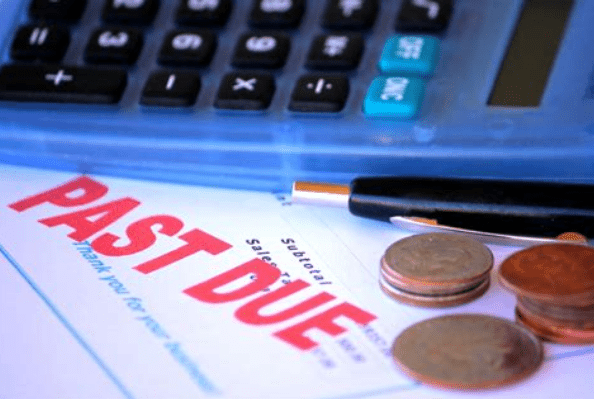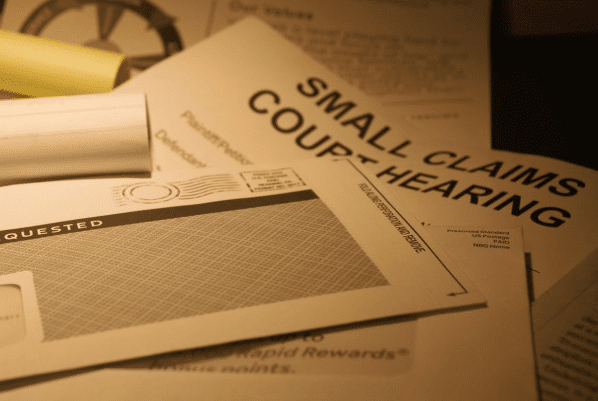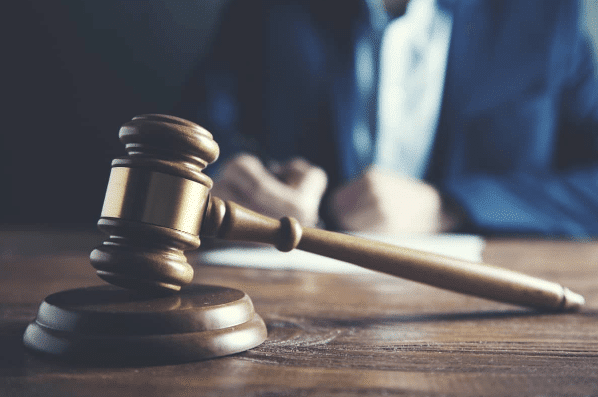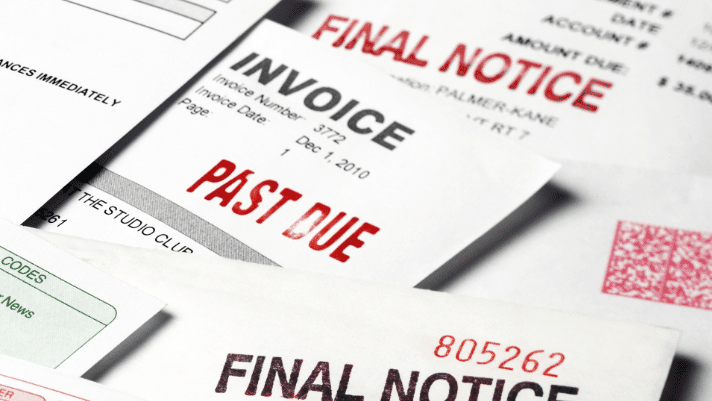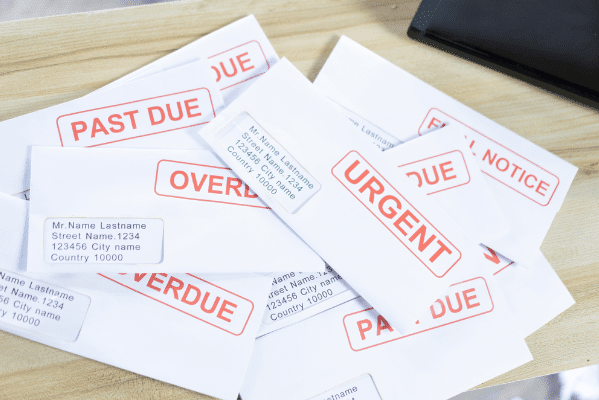In Georgia, you must respond to a debt collection lawsuit within 30 days to avoid losing by default. Drafting and filing a written Answer is crucial, where you address each claim against you and assert any affirmative defenses. ZumaZip streamlines this process, helping you draft and file your Answer quickly, significantly increasing your chances of winning.
The economic hardships triggered by the COVID-19 pandemic have left many individuals facing job loss and financial strain. As a result, more people are struggling to meet basic needs and keep up with loan payments, including mortgages, student loans, and credit cards.
Dealing with debt collectors can add to this stress, leading to emotional strain. Ignoring their correspondence in the hope that they’ll stop their collection efforts is not a viable solution. In fact, failing to respond may escalate the situation to litigation.
Ignoring a Summons and Complaint filed by a debt collector can have serious consequences. If you don’t respond, the court may assume the allegations are true and enter a summary judgment against you. Unfortunately, many people fail to respond to these legal complaints.
Statistics show that approximately ten million Americans face debt collection lawsuits each year, with only 10 percent responding. This means the majority don’t respond, resulting in a default judgment for the debt collector.
A default judgment gives the debt collector the authority to seize assets and garnish wages. To prevent this, it’s crucial to file an Answer that formally addresses the Summons and Complaint filed by the debt collector. Taking this step is essential to protect your rights and financial well-being.
File a response to a debt collection lawsuit in 15 minutes with ZumaZip
Georgia deadline for answering a debt collection Summons
Under Georgia’s debt collection laws, a defendant typically has 30 days to file an answer to a Summons and Complaint after being served. In cases where service of process is delayed due to extenuating circumstances, you may request an extension from the court, allowing an additional 15 days to file a response.
However, failing to file an answer within 45 days significantly increases the likelihood of the court ruling in favor of the debt collector. If the debt collector demonstrates your failure to comply with the response deadline, you risk losing the case through the court entering a default judgment against you. It’s crucial to adhere to the specified deadlines to protect your rights and interests in the legal proceedings.
Georgia Answer to Summons forms
Filing an Answer to a Summons and Complaint is crucial because it allows you to formally address and contest the claims made by the debt collector. In your Answer, you have the opportunity to deny, accept, or indicate insufficient information regarding specific allegations brought forth by the debt collector.
It’s essential for your Answer to adhere to the correct format and address all claims stated in the collector’s complaint. Failing to do so may result in the court ruling in favor of the debt collector on uncontested claims, even if you filed your Answer within the statutory deadline.
To mitigate the risk of potential errors, such as failing to respond to all claims, consider utilizing ZumaZip. ZumaZip simplifies the process by generating a comprehensive Answer document based on the information you provide, ensuring that your response is thorough and effectively addresses all relevant points.
Here is ZumaZip’s sample Answer to a Complaint in Georgia.
It’s important to note that if you accept any of the claims made by the debt collector, they won’t need to provide proof to the court, and the judge will automatically issue a judgment for those debts. Conversely, if you deny any claims, the debt collector must offer substantial proof to validate them. It’s not advisable to deny claims you know to be true, as doing so may lead the judge to question your credibility.
For allegations where you indicate insufficient information, the debt collector will be required to provide additional proof to both you and the court. Additionally, you have the option to issue a counterclaim against the debt collector. If you choose this route, you must include the counterclaim in a separate document and mail it to the court and plaintiff along with your Answer. This allows you to assert your rights and potentially seek recourse against the debt collector.
Use the ZumaZip Answer form to respond to your debt lawsuit fast.
Answer filing fees for Georgia
In Georgia, some courts impose a filing fee when entering an Answer into a case, which varies by county and court. Typically, courts that mandate electronic filing are the ones that charge these fees, ranging from $14 to $30.
ZumaZip simplifies this process by calculating the Answer filing fee for you, alleviating the need for manual calculations.
If you’re unable to afford the filing fee, you may contact the court clerk to request a fee waiver or forgiveness. To qualify, you typically need to demonstrate that you receive public benefits such as food stamps, or prove that your income cannot cover both your family’s needs and court fees. The court may accept your request upon review of your circumstances.
How to respond to a debt collection case in Georgia
Your case commences upon receiving the Summons and Complaint, typically delivered in person or to a responsible individual on your behalf to prevent any claims of non-receipt.
Once served, you have 30 days to Answer a debt lawsuit in Georgia, including mailing a copy of your Answer to both the court and the plaintiff. Follow these steps:
- Address each issue of the Complaint.
- Assert any affirmative defenses.
- File the Answer with the court and serve the plaintiff.
If you believe you were incorrectly served, such as if you’ve already paid the debt or were not the borrower, consider drafting a motion to dismiss the Summons. Submitting this motion before the Answer halts the 30-day deadline. Should the court reject the dismissal motion, you’ll then have 30 days to file an Answer.
If financial constraints hinder your ability to proceed, bankruptcy may halt debt collection efforts. Alternatively, contact the debt collector or creditor to discuss repayment or settlement options outside of court, potentially saving time and legal fees.
Let’s delve deeper into the three steps for responding to a debt lawsuit in Georgia.
1. Answer each issue of the complaint
The Complaint document typically includes numbered paragraphs stating the claims against you. You can either deny, accept, or state that you are not sure about some of the complaints stated in the paragraphs. It is extremely important to respond to each allegation listed in the Complaint.
The first section of your Answer document should be a list of responses to each claim from the Complaint. You can answer each claim with one of the following responses:
- Admit the claim. This is like saying, “this is true.”
- Deny the claim. This is like saying, “prove it.”
- Deny the claim due to lack of knowledge. This is like saying, “I don’t know.”
Respond to your debt lawsuit in just 15 minutes online.
2. Assert your affirmative defenses
If proven correct, affirmative defenses are any reasons to mitigate the legal consequences of not paying your debt on time. The court can dismiss the lawsuit based on your affirmative defenses or reduce the amount owed.
You can assert affirmative defenses if a debt collector serves you, but you are not the individual they believe owes them the debt. This error usually happens if you share a name with the rightful borrower or someone stole your personal information and used it to get a loan.
Secondly, debt collectors have a strict set of rules they need to follow. If they break any of these rules, you can sue them, and the court will dismiss the case.
Generally, in Georgia, debt collectors cannot:
- Threaten you.
- Tell anyone about the debt.
- Serve you with a revealing envelope.
- Contact you before 8 am or after 9 pm Georgia time.
- Contact you at work if they know your employer does not permit personal calls.
- Contact you personally when they are aware you have an attorney.
If you had already successfully filed for bankruptcy, or if you filed for bankruptcy after the plaintiff served you and your bankruptcy case was approved, then the lawsuit will be automatically dismissed.
If you already cleared the debt in full yet were still served, you can evade the lawsuit by providing proof of payment.
Sometimes, the debt collector may charge an interest rate that does not align with the initial creditor’s rates offered to you when taking the loan. If you can prove this, the court will reduce the amount you need to pay.
If you can prove that you were not of sound mind when you took the loan or are not of sound mind during the case, the court can waive or reduce the debt.
Make the right affirmative defense the right way with Zuma.
3. File the Answer with the court and serve the plaintiff
Lastly, you need to make three copies of the answer document. Mail one copy to the address where the summons and complaint came from, send another copy to the debt collector’s attorney, and then keep the final copy with you for future references.
It is advisable to mail the documents via priority mail for faster delivery, especially when facing stiff deadlines. Alternatively, you could deliver the Answer documents in person to the court’s clerk and the offices of your debt collectors.
ZumaZip can file your Answer for you in Georgia.
Statute of limitations on debt in Georgia
The statute of limitations is the time limit that a creditor or debt collector can sue someone for a debt. You read that right—if the statute of limitations on your debt has expired, then you can’t be taken to court for it. That being said, this time limit is different in every state, and the type of debt involved also changes things.
Accord to Georgia Code, §9-3-25 states:
“All actions upon open account, or for the breach of any contract not under the hand of the party sought to be charged, or upon any implied promise or undertaking shall be brought within four years after the right of action accrues.”
And §9-3-24 states:
“All actions upon simple contracts in writing shall be brought within six years after the same become due and payable.”
In other words, the statute of limitations on debt in Georgia is four years for oral contracts and open accounts and six years for written contracts. Therefore, the Georgia statute of limitations on credit card debt is four years.
This means that a creditor or debt collector only has four years to sue for a credit card debt in Georgia, starting from the date of the last activity on the debt account or the first day that you stopped making payments.
The table below further outlines the Georgia statute of limitations on different types of debt:
| Debt Type | Deadline |
|---|---|
| Credit Card | 4 years |
| Medical | 6 years |
| Student Loan | 6 years |
| Auto Loan | 6 years |
| Mortgage | 6 years |
| Personal Loan | 6 years |
| Judgment | 7 years |
| Ga. Code § 9-3-25, § 9-3-24, and § 9-12-60 |
The statute of limitations is by far the best affirmative defense to use in your Answer, as there is no way around it. If you can prove the four-year period has expired, then you will automatically win the case. This decision is not dependent on whether or not you owe the debt.
Use the statute of limitations as an affirmative defense and win your debt lawsuit.
Georgia legal aid organizations
Understandably, people who default on paying their debts are already facing financial constraints; therefore, they cannot afford legal fees.
If you live in Georgia and find yourself in such a situation, you can check out this site for a list of nonprofit organizations that offer free or low-cost legal services to qualifying persons.
If you happen to have been in the military or are in active service, check out the military legal assistance program. It connects military personnel to state bar members offering pro bono services or discounts.
Key takeaways
To sum up, here are some important things you need to know about when drafting an Answer to a debt collection summons in Georgia:
- While receiving a debt collection summons can be stressful, it is not advisable to ignore them. Ignoring a summons does not mean that the debt will magically disappear from your records.
- When you ignore a Summons and Complaint, it will likely result in the debt collector filing a motion for default judgment that will probably be granted by the court, since you did not respond.
- To stand a chance in a legal battle against a debt collector in Georgia, you need to take action and timely file an Answer to the debt collector’s complaint within the 30 days.
What is ZumaZip?
ZumaZip is a convenient solution designed to streamline your response to a debt collection lawsuit. Here’s a breakdown of what you can expect when you use ZumaZip:
Firstly, you’ll access our user-friendly web application, which guides you through the process step by step. You’ll be prompted to answer a series of questions related to your specific situation. Once you’ve completed the questionnaire, you have the option to either print out the finalized forms and mail them to the appropriate courts yourself, or you can opt to utilize ZumaZip’s services to file them on your behalf. Additionally, if you choose this option, an attorney will review your document for added peace of mind.
If you’re seeking guidance on how to effectively respond to a debt collection lawsuit, ZumaZip can provide the assistance you need. Feel free to explore our FAQs for more information on what ZumaZip has to offer.
What if I haven’t been sued yet?
If you’ve only received a collections notice, but not a lawsuit, the best way to respond is with a Debt Validation Letter. When a debt collector contacts you in any way, whether it’s by phone or mail, you can respond by formally requesting a debt validation with a Debt Validation Letter . This letter notifies the collector that you dispute the debt and forces them to provide proof you owe the debt. They can’t call you or continue collecting until they provide validation of the debt. This flowchart shows how you can use a Debt Validation Letter to win.
Get started with a Debt Validation Letter here.
How to Answer a Summons for debt collection in all 50 states
Here’s a list of guides on how to respond to a debt collection lawsuit in each state:
- Alabama
- Alaska
- Arizona
- Arkansas
- California
- Colorado
- Connecticut
- Delaware
- Florida
- Georgia
- Hawaii
- Idaho
- Illinois
- Indiana
- Iowa
- Kansas
- Kentucky
- Louisiana
- Maine
- Maryland
- Massachusetts
- Michigan
- Minnesota
- Mississippi
- Missouri
- Montana
- Nebraska
- Nevada
- New Hampshire
- New Jersey
- New Mexico
- New York
- North Carolina
- North Dakota
- Ohio
- Oklahoma
- Oregon
- Pennsylvania
- Rhode Island
- South Carolina
- South Dakota
- Tennessee
- Texas
- Utah
- Vermont; Vermont (Small Claims court)
- Virginia
- Washington
- West Virginia
- Wisconsin
- Wyoming
Guides on how to beat every debt collector
Hey there! Facing off against a debt collector can feel like a daunting challenge, but fear not! We’re here to help you navigate through it all with our handy guides designed to assist you in beating every debt collector you encounter. Whether you’re facing a new lawsuit or dealing with a persistent collector, we’ve got your back. Stay positive, stay informed, and let’s tackle this together!
- Absolute Resolutions Investments LLC
- Accredited Collection Services
- Alliance One
- Amcol Clmbia
- American Recovery Service
- Asset Acceptance LLC
- Asset Recovery Solutions
- Associated Credit Services
- Autovest LLC
- Cach LLC
- Cavalry SPV I LLC
- Cerastes LLC
- Colinfobur
- Covington Credit
- Crown Asset Management
- CTC Debt Collector
- Cypress Financial Recoveries
- Delanor Kemper & Associates
- Eagle Loan of Ohio
- Educap
- Estate Information Services
- FIA Card Services
- Forster & Garbus
- Freshview Solutions
- Fulton Friedman & Gullace LLP
- Harvest Credit Management
- Howard Lee Schiff
- Hudson & Keyse LLC
- Integras Capital Recovery LLC
- Javitch Block
- Jefferson Capital Systems LLC
- LVNV Funding
- Mannbracken
- Mariner Finance
- Medicredit
- Michael J Adams PC
- Michael J Scott
- Midland Funding LLC
- Mullooly, Jeffrey, Rooney & Flynn
- Mountain Land Collections
- MRS Associates
- National Collegiate Trust
- Nationstar Foreclosure
- Northstar Capital Acquisition
- NCEP LLC
- NRC Collection Agency
- OneMain Financial
- Palisades Collection LLC
- Pallida LLC
- Paragon Revenue Group
- Pinnacle Collections Agency
- PMAB LLC
- Portfolio Recovery Associates
- Provest Law
- PYOD LLC
- Reunion Student Loan Finance Corporation
- Revenue Group
- Regents and Associates
- RSIEH
- Salander Enterprises LLC
- Second Round Sub LLC
- Security Credit Services
- Sherman Financial Group
- Suttell and Hammer
- T-Mobile
- Transworld Systems
- Tulsa Teachers Credit Union
- UCB Collection
- Velo Law Office
- Velocity Investments
- Waypoint Resource Group
- Weinberg and Associates
- Wolpoff & Abramson
Settle your medical debt
Having a health challenge is stressful, but dealing medical debt on top of it is overwhelming. Here are some resources on how to manage medical debt.
- Am I Responsible for My Spouse’s Medical Debt?
- Do I Need a Lawyer for Medical Bills?
- Do I Need a Lawyer to Fight Medical Bill Debt?
- Does Bankruptcy Clear Medical Debt?
- How Much Do Collection Agencies Pay for Medical Debt?
- How to Find Medical Debt Forgiveness Programs
- Is There a Statute of Limitations on Medical Bills?
- Medical Debt Statute of Limitations by State
- Summoned to Court for Medical Bills — What Do I Do?
- Summoned to Court for Medical Bills? What to Do Next
Stop calls from Debt Collectors
Do you keep getting calls from an unknown number, only to realize that it’s a debt collector on the other line? If you’ve been called by any of the following numbers, chances are you have collectors coming after you, and we’ll tell you how to stop them.

























